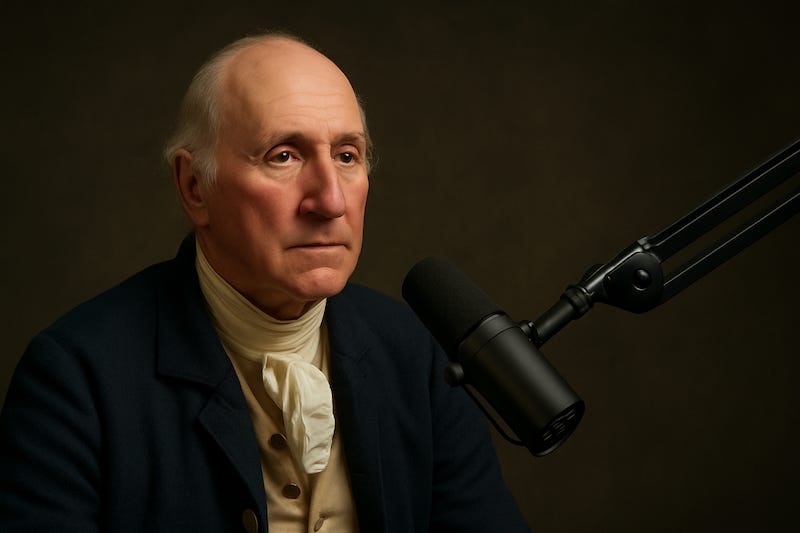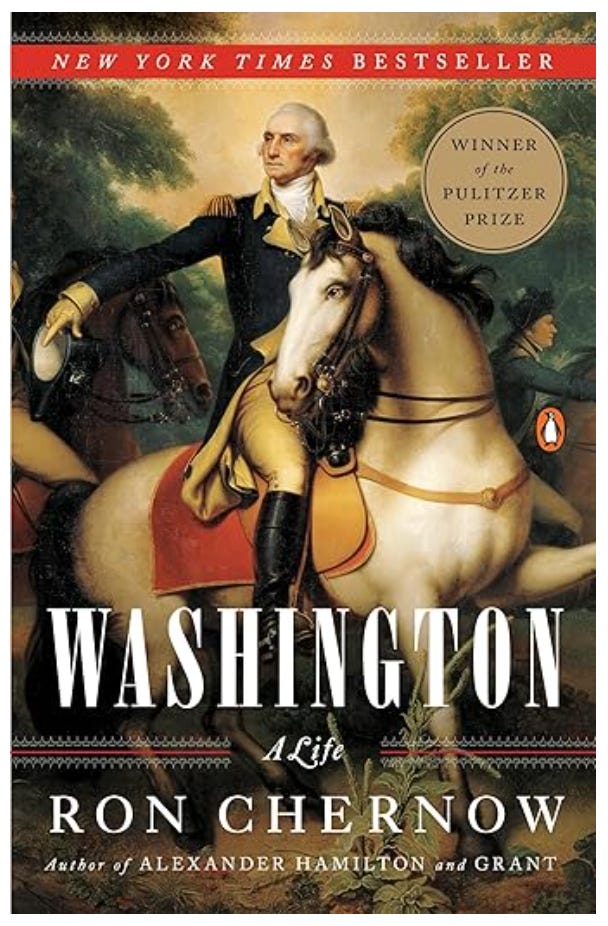George Washington on Leadership, Division, and the Digital Age
Recorded via ChronoTranscriptor™ 3.2 — February 22, 2025
[Host Introduction]
Today on ChronoTalks, we sit down with one of the most iconic figures in American history: George Washington, commander of the Continental Army, presiding officer of the Constitutional Convention, and the first President of the United States. Through the magic of our ChronoTranscriptor™—a proprietary time-travel protocol—we’ve brought Washington to 2025 for a one-on-one interview.
What follows is an imagined but faithful conversation, shaped by what we know of his character, writings, and leadership style. It is not a historical reenactment. It is, instead, an opportunity to hear how the man himself might respond to our modern world.
[Interview Begins]
Host: General Washington, thank you for taking the time to speak with us today.
Washington: I consider it a duty, sir. If a conversation can aid the public good—even two centuries removed—I am happy to oblige.
Host: In your 1796 Farewell Address, you warned strongly against political factions. What compelled you to do that?
Washington: My concern, even in my own time, was how quickly people chose sides not for principle but for personal allegiance. I saw firsthand how party divisions could erode unity. My fear was that loyalty to a party would one day outweigh loyalty to the nation. And once that happens, decisions are no longer made for the common good, but for the success of one group over another.
Host: Would you say you see echoes of that today?
Washington: I see something far more entrenched. Political parties now seem to be permanent fixtures—tribes, even. It troubles me. When elected officials speak more to their party than to their people, governance becomes a game of endurance rather than collaboration. In my day, we quarreled, but we understood the stakes. I hope your generation remembers that democracy does not survive on competition alone. It also requires restraint, humility, and compromise.
Host: Let’s talk about leadership. You were offered a kingship and refused. Twice you stepped away from power. What, to you, defines a great leader?
Washington: The willingness to step away is part of it. I never sought power—I accepted it when called, and I relinquished it when the job was done. Leadership requires more than ambition. It requires discipline. A leader must constantly ask: Is this good for me, or good for the country?
I worried that my actions would become precedent. Every choice I made, I considered not just for its moment, but for the generations to come. Leadership is not about being bold; it is about being deliberate.
Host: We now live in a world of instant communication—social media, viral messaging, 280-character declarations. What do you think of this digital age?
Washington: I would marvel at the machinery and worry about the manners. To speak instantly is a luxury. To speak wisely remains a responsibility. If your words can reach a thousand ears in a moment, then your burden is not to say more—it is to say better.
In my time, a letter might take weeks to arrive. That delay forced reflection. Today, the distance between thought and publication is a finger’s width. I can only hope your citizens have learned to pause before pressing send.
Host: I want to ask about a difficult topic—slavery. How do you reckon with that part of your life?
Washington: With discomfort, and reflection. I was born into a society that accepted slavery as a fact of life. But by the end of mine, I could no longer accept it. I took steps to free those I held in bondage—slow steps, too late by any honest measure—but steps nonetheless.
I believed the system would unravel over time, as the ideals of liberty became more fully realized. I was wrong to think time alone would change it. Some things demand action, not patience. That is something I have come to understand.
Host: Finally, when you look at America today—its technology, its power, its people—what would you say to the nation?
Washington: You have accomplished wonders. You have built bridges across continents and reached beyond the stars. But no achievement in steel or circuitry will save you if your principles falter. You must be vigilant stewards—not just of progress, but of purpose.
Remember that freedom is not license. It is responsibility. And a republic is not a machine that runs itself. It requires attention, humility, and above all—unity.
[Closing Remarks]
Host: General Washington, thank you for your time, your insight, and your service to this nation—even across centuries.
Washington: The pleasure is mine. May your republic endure, not through force, but through wisdom.
Next Episode: Cleopatra – On Power, Perception, and the Price of Being a Woman in History.
Subscribe to ChronoTalks for more exclusive interviews with the people who shaped our world.
Renowned biographer Ron Chernow delivers a richly textured and deeply insightful portrait of George Washington—the founding father and first president of the United States. With unmatched scope and narrative drive, this masterful single-volume biography guides readers through Washington’s adventurous youth, his heroic leadership in the Revolutionary War, his pivotal role at the Constitutional Convention, and his exemplary presidency. Drawing on extensive research, Chernow dispels the enduring myth of Washington as a stiff, emotionless figure, revealing instead a dynamic, passionate leader of strong convictions and complex character. More information…




